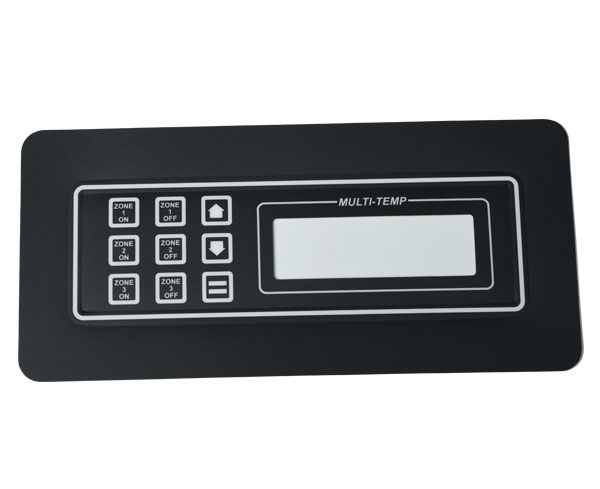
When choosing a substrate for film or acrylic panels, there are several factors to consider, including the environment in which it will be used, its expected life, the cost budget, and the physical and chemical properties required. Here are some key points to help you decide on the right type of substrate for your project.
Film Panel Substrate Options
Polycarbonate (PC)
Properties: Polycarbonate has good impact resistance, high tensile strength, and good heat and cold resistance. It is resistant to weak acids and bases and has a light transmission rate of approximately 78%. The temperature range of use is generally between -30°C and 90°C.
Scope of application: Due to its wide range of applicability, polycarbonate is one of the materials commonly used for membrane switch panels, and is particularly suitable for application scenarios that require good durability and a certain degree of transparency.
Polyester (PET)
Characteristics: Polyester has good toughness and abrasion resistance, excellent tensile strength, and a wide temperature resistance range (-10°C to 120°C). Although it is not alkali resistant, it has high light transmission (approx. 89%) and good ageing resistance.
Scope of application: Polyester is suitable for film panels that require high transparency, high temperature resistance and long-term use, especially those applications that require working in more demanding environments.

Acrylic panel substrate selection
Acrylic (polymethyl methacrylate)
Characteristics: Acrylic has transparency, good chemical stability, weather resistance and aesthetic appearance. It is easy to dye and process and is suitable for a wide range of application scenarios.
Scope of application: Acrylic panels are typically used in applications that require high transparency and aesthetics, such as display cases, signage, and directional signs. It is suitable for both indoor and outdoor environments, but it should be noted that acrylic may not be as impact resistant as polycarbonate or polyester.
To summarize
When choosing a substrate for film or acrylic panels, the following aspects should be considered:
Usage environment: Consider the type of environment the panel will be exposed to, such as temperature changes, chemical exposure, etc.
Mechanical Properties: Consider the physical stresses the panel will need to withstand, such as impact, friction, etc.
Transparency: If you need the panel to have a high degree of transparency, then polyester or acrylic may be a better choice.
Cost: Different materials cost different amounts and need to be weighed against your budget.
Aesthetics: Acrylic panels offer unique advantages in terms of aesthetics due to their excellent transparency and workability.
The choice of substrate should be based on project-specific needs and constraints. For example, if your application requires working in bad temperatures, then polyester may be a better choice; if your application requires good impact resistance, then polycarbonate is more suitable; and for applications requiring high transparency and aesthetics, then acrylic panels would be ideal.